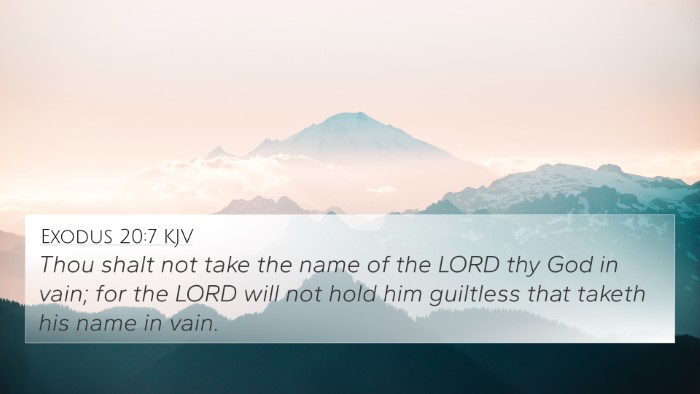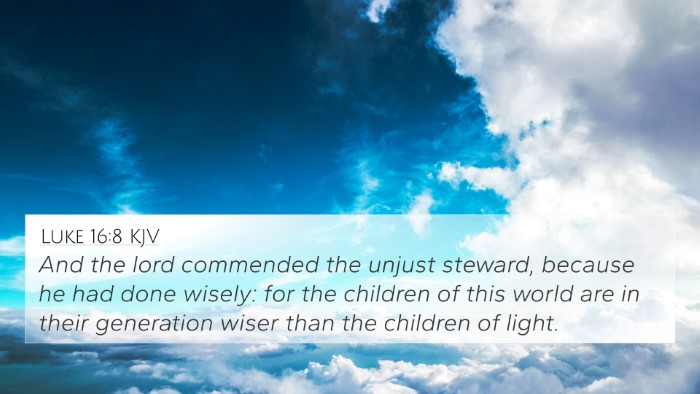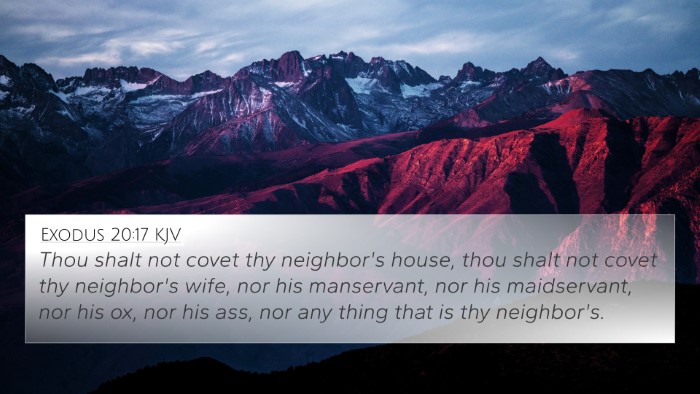This section features a detailed cross-reference designed to enrich your understanding of the Scriptures.
Below, you will find carefully selected verses that echo the themes and teachings related to 2 Kings 5:20 KJV. Click on any image to explore detailed analyses of related Bible verses and uncover deeper theological insights.
 2 Kings 4:12 (KJV) »
2 Kings 4:12 (KJV) »
And he said to Gehazi his servant, Call this Shunammite. And when he had called her, she stood before him.
 2 Kings 4:31 (KJV) »
2 Kings 4:31 (KJV) »
And Gehazi passed on before them, and laid the staff upon the face of the child; but there was neither voice, nor hearing. Wherefore he went again to meet him, and told him, saying, The child is not awaked.
 2 Kings 6:31 (KJV) »
2 Kings 6:31 (KJV) »
Then he said, God do so and more also to me, if the head of Elisha the son of Shaphat shall stand on him this day.
 2 Kings 4:36 (KJV) »
2 Kings 4:36 (KJV) »
And he called Gehazi, and said, Call this Shunammite. So he called her. And when she was come in unto him, he said, Take up thy son.
 2 Peter 2:14 (KJV) »
2 Peter 2:14 (KJV) »
Having eyes full of adultery, and that cannot cease from sin; beguiling unstable souls: an heart they have exercised with covetous practices; cursed children:
 Acts 8:18 (KJV) »
Acts 8:18 (KJV) »
And when Simon saw that through laying on of the apostles' hands the Holy Ghost was given, he offered them money,
 2 Timothy 4:10 (KJV) »
2 Timothy 4:10 (KJV) »
For Demas hath forsaken me, having loved this present world, and is departed unto Thessalonica; Crescens to Galatia, Titus unto Dalmatia.
 Titus 1:7 (KJV) »
Titus 1:7 (KJV) »
For a bishop must be blameless, as the steward of God; not selfwilled, not soon angry, not given to wine, no striker, not given to filthy lucre;
 Exodus 20:7 (KJV) »
Exodus 20:7 (KJV) »
Thou shalt not take the name of the LORD thy God in vain; for the LORD will not hold him guiltless that taketh his name in vain.
 1 Peter 5:2 (KJV) »
1 Peter 5:2 (KJV) »
Feed the flock of God which is among you, taking the oversight thereof, not by constraint, but willingly; not for filthy lucre, but of a ready mind;
 1 Timothy 6:9 (KJV) »
1 Timothy 6:9 (KJV) »
But they that will be rich fall into temptation and a snare, and into many foolish and hurtful lusts, which drown men in destruction and perdition.
 Acts 5:2 (KJV) »
Acts 5:2 (KJV) »
And kept back part of the price, his wife also being privy to it, and brought a certain part, and laid it at the apostles' feet.
 John 12:5 (KJV) »
John 12:5 (KJV) »
Why was not this ointment sold for three hundred pence, and given to the poor?
 John 13:2 (KJV) »
John 13:2 (KJV) »
And supper being ended, the devil having now put into the heart of Judas Iscariot, Simon's son, to betray him;
 John 6:70 (KJV) »
John 6:70 (KJV) »
Jesus answered them, Have not I chosen you twelve, and one of you is a devil?
 Luke 16:8 (KJV) »
Luke 16:8 (KJV) »
And the lord commended the unjust steward, because he had done wisely: for the children of this world are in their generation wiser than the children of light.
 Luke 12:15 (KJV) »
Luke 12:15 (KJV) »
And he said unto them, Take heed, and beware of covetousness: for a man's life consisteth not in the abundance of the things which he possesseth.
 Habakkuk 2:9 (KJV) »
Habakkuk 2:9 (KJV) »
Woe to him that coveteth an evil covetousness to his house, that he may set his nest on high, that he may be delivered from the power of evil!
 Jeremiah 22:17 (KJV) »
Jeremiah 22:17 (KJV) »
But thine eyes and thine heart are not but for thy covetousness, and for to shed innocent blood, and for oppression, and for violence, to do it.
 Psalms 10:3 (KJV) »
Psalms 10:3 (KJV) »
For the wicked boasteth of his heart's desire, and blesseth the covetous, whom the LORD abhorreth.
 1 Samuel 14:39 (KJV) »
1 Samuel 14:39 (KJV) »
For, as the LORD liveth, which saveth Israel, though it be in Jonathan my son, he shall surely die. But there was not a man among all the people that answered him.
 Exodus 20:17 (KJV) »
Exodus 20:17 (KJV) »
Thou shalt not covet thy neighbor's house, thou shalt not covet thy neighbor's wife, nor his manservant, nor his maidservant, nor his ox, nor his ass, nor any thing that is thy neighbor's.


























